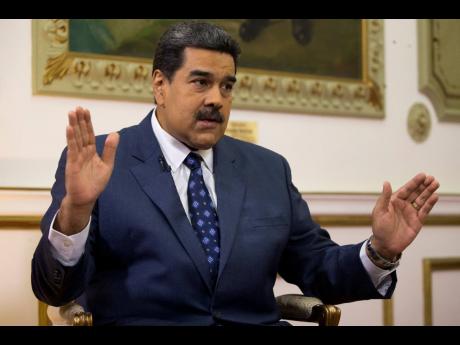Editorial | Navigating oil and diplomacy
Although the Holness administration says it is willing to explore the possibility of a new oil deal with Venezuela, it is highly unlikely that anything will happen unless there is a green light from Washington signalling that it is safe to proceed. The Government will also need assurance from the domestic Opposition that the matter won’t be used against it as a political battering ram. Given the global crisis, that should be offered.
But even if Kingston crosses those hurdles, striking an oil deal with Caracas will require a nimble diplomacy, rather than the leaden-footed statecraft with which it approached its recent relations with Venezuela, notwithstanding Nicolás Maduro’s wish to emerge from the thrall of sanctions. For while Jamaica and Venezuela maintain formal diplomatic ties, their relationship is badly frayed. Contact between them is minimal.
That is not to say the situation cannot be rescued. After all, the United States, which maintains heavy diplomatic and economic sanctions on Venezuela, recently sent envoys to Caracas to scout out the possibility of improving relations and reopening Venezuela’s oil spigots to America and the West.
Venezuela used to be Jamaica’s major oil supplier, providing, at one stage, up to 23,000 barrels a day under its PetroCaribe facility, under which beneficiaries paid cash for only 50 per cent of their purchases. The remaining half of the debt was converted to long-term soft loans, at rates as low as one per cent, if the money was invested in domestic development projects.
By the time the scheme folded in 2019, Jamaica, over nearly 14 years, had flows of over US$5 billion in PetroCaribe funds, at a time when multilateral and private markets were lending it little – at high interests. Further, in 2015, with Caracas’ coffers low, Jamaica was able to pay down US$1.5 billion of its Venezuela debt at a huge discount, helping to put a noticeable dent in its own debt-to-GDP ratio.
TURNED SOUR
But in recent years, under Andrew Holness’ government, Jamaica’s relations with Venezuela have turned decidedly sour, particularly in the wake of US sanctions against Nicolás Maduro’s left-wing government, after a disputed presidential election which the Venezuelan opposition claimed was neither free nor fair.
At the Organization of American States (OAS), Jamaica voted in favour of a slew of resolutions orchestrated by the United States to isolate Venezuela. Kingston also sided with the Americans against recognising Mr Maduro as Venezuela’s legitimate president when his new term began in 2019. However, unlike the US and many other countries, Jamaica did not formally recognise Juan Guaidó, a leading opposition figure who was head of the National Assembly, as president. Jamaica-Venezuela relations went further south with the Jamaican decision to use legislation to acquire Venezuela’s 51 per cent in the Petrojam oil refinery when Venezuela declined to sell its stake in the plant – and not at the offered price.
Economics and a shifting geopolitical calculus in Washington, accelerated by Russia’s invasion of Ukraine, may be opening policy options for Jamaica. When Nigel Clarke, the island’s finance minister, crafted his 2022-23 Budget, his projection was for oil at US$67.50 per barrel. It is now over US$100 per barrel. That is partly the effect of an American ban on the importation of Russian oil, and other Western economic sanctions on that country. Additionally, the Russia-Ukraine war has exacerbated COVID-19-related supply chain issues, causing a spiral in the prices of food and commodities.
RE-ENGAGEMENT
It is against this backdrop that Joe Biden, the US president, has contemplated allowing Venezuelan oil back into Western markets. Therein, it seems, is Jamaica’s possible opening for a re-engagement with Caracas. “I welcome the suggestion of my colleague, and I can commit that we will have a discussion at length about the matter,” the island’s energy minister, Daryl Vaz, said in Parliament in response to the early proposal by his Opposition shadow, Phillip Paulwell, that Venezuelan was a good option for oil.
Noticeably, Mr Vaz did not define the “we”. Neither did he specifically commit to broaching the issue with Caracas. It might have been just a politically good thing to say.
If, indeed, the minister is serious, Washington’s overture to Mr Maduro, and Mr Biden’s seeming willingness to throw Mr Guaidó under the bus, is a good signal for Jamaica – as well as a lesson in great power exercise of geopolitical interests. It also is a reminder of why non-alignment in global political diplomacy served Jamaica so well for so long.
However, for the Venezuelans, oil would hardly be the only matter on the table in any discussion with Jamaica. Kingston, therefore, would have to be prepared to address a whole raft of issues.
Mr Vaz also raised the possibility of Jamaica receiving oil and liquefied natural gas (LNG), which essentially would reprise an oil arrangement from the 1970s when the idea of South-South cooperation had traction. But should the deal come to fruition, Mr Vaz will have to work his way around significant obstacles, not least the difficulties of shipping LNG and petroleum from Nigeria to Jamaica.
The last time a Jamaican-Nigeria oil arrangement was in place, up to the mid-2000s, Jamaica used a middleman, Glencore (it succeeded Trafigura Beheer), to lift the oil (30,000 bpd), which it sold at a commission and, presumably, significant profit outside of the Americas. Jamaica found other suppliers to deliver to the island.
In the event, and given the public’s perception about the Trafigura arrangements, Mr Vaz will have to be transparent with any scheme with Nigeria – its logistics and its financial arrangement.

